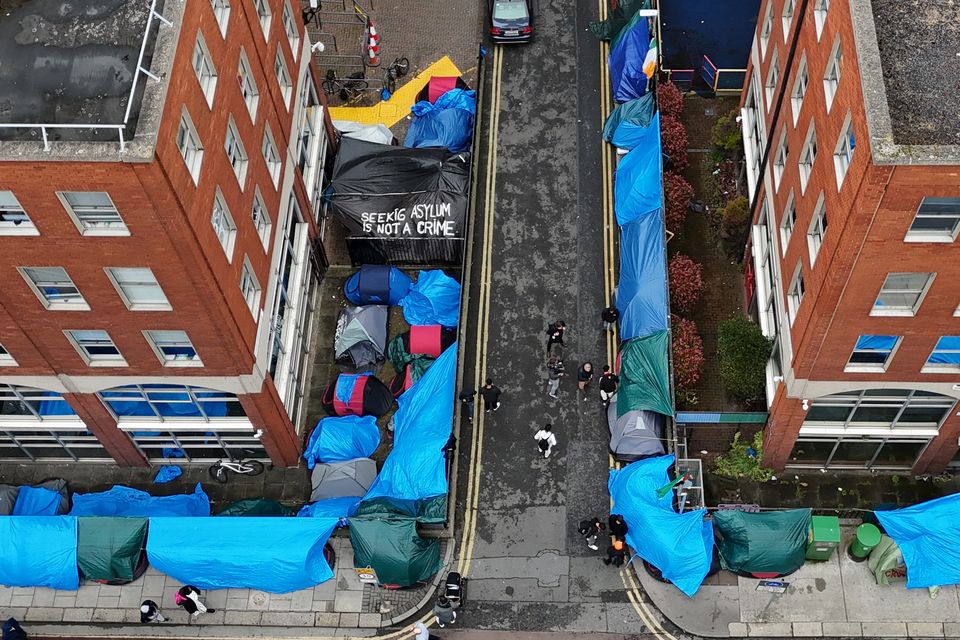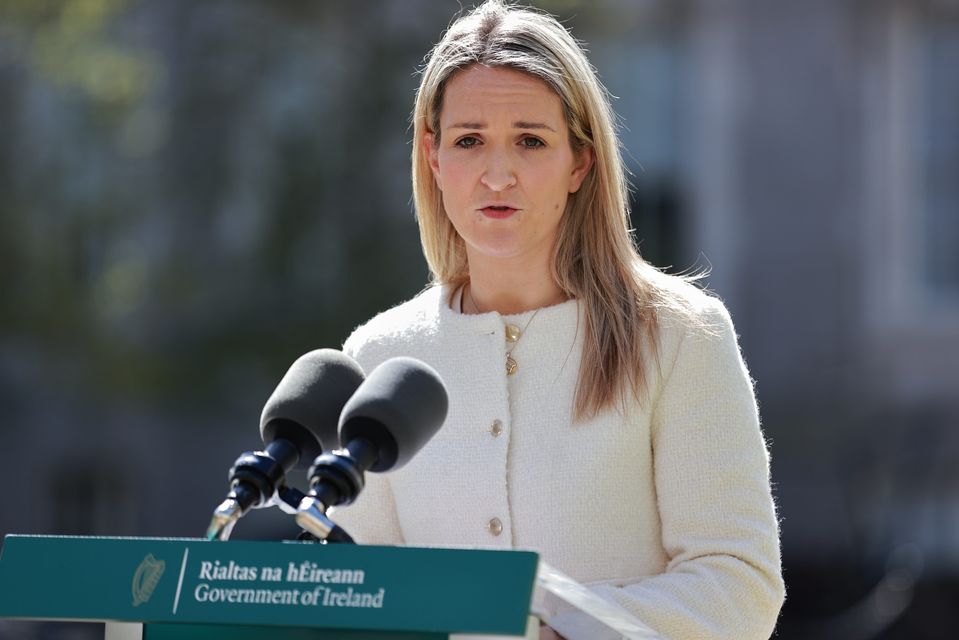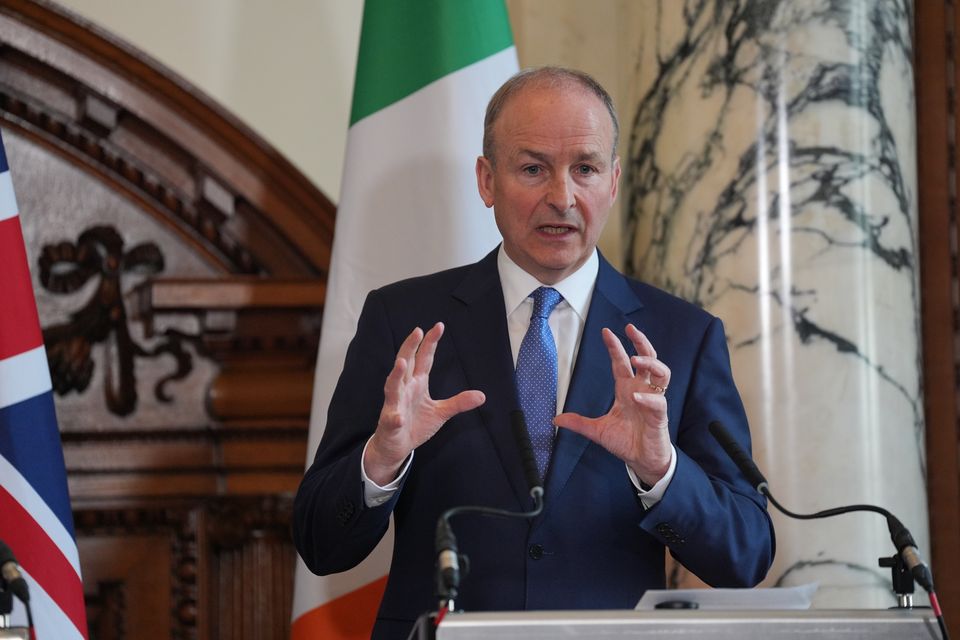IPO registrations not conclusive evidence for claim 80pc of asylum seekers coming via Northern Ireland, ESRI warns
Tents housing asylum seekers near to the Office of International Protection in Dublin (Niall Carson/PA)
An increase in first-time registrations at the International Protection Office is not conclusive evidence that there are more asylum seekers coming into Ireland from Northern Ireland, a think tank has warned.
It comes as the Irish Department of Justice claimed that approximately 73pc of asylum seekers are coming into the country through Northern Ireland.
Government officials, including Taoiseach Simon Harris and Justice Minister Helen McEntee, said an increase in the number of people presenting at the IPO office rather than Dublin Airport or other ports indicates there is a rise in asylum seekers coming over the land border.
An earlier claim by Ms McEntee that 80pc of asylum seekers are coming into the country from Northern Ireland was questioned by human rights and refugee organisations, while deputy premier Micheal Martin said it was not based on evidence, statistics or data.
On Monday evening, the department said that 91pc of applications at the IPO so far in 2024 were made there for the first time rather than an airport or other port.
It said that its operational assessment was that more than 80% of cases of those applying for the first time in the IPO have entered over the land border. This would equate to approximately 73pc of all applications this year.
Refugee groups have cast doubt on the figure for the proportion of Northern Ireland arrivals while a think tank said a first-time registration rate of approximately 80pc at the IPO would not be “unusual” compared with other years.
Nick Henderson, chief executive of the Irish Refugee Council, said: “We don’t know how the Department of Justice came to the 80pc figure and, as far as we know, has not published its methodology.
“Just because a person has not applied for protection at an airport or port it does not automatically mean the person has crossed the border from Northern Ireland.”
The Economic and Social Research Institute (ESRI) also said that data on IPO presentations alone is not conclusive evidence of the route being used or the reason for applying in Ireland as there are many possible reasons why people might apply in-land rather than at the border.
Helen McEntee said 80% of asylum seekers are coming into the country from Northern Ireland (Liam McBurney/PA)
The ESRI also said presentations at the IPO compared to ports have often fluctuated significantly.
While noting there is little research on what might drive those fluctuations, an ESRI spokeswoman said that between 2017 and 2021, the percentage of international protection applications made at the IPO fluctuated between 47.6pc and 79.5pc, with little discernible pattern.
The ESRI researcher also said that “deflection effects” of asylum seekers to neighbouring countries are most common in nationalities that have travelled to both countries.
“The UK is seeing significant increases in asylum applications at the same time as Ireland, many from nationalities that are different to those applying in Ireland (although there are overlaps).
“The report indicated that for nationalities that traditionally applied in both countries, there may be a deflection effect from the UK.
“However, it is very difficult to determine where this is the case without primary data collection with international protection applicants, which this research did not undertake.
“Ireland has historically had much lower asylum applications than other western EU countries in particular, as Ireland experienced a transition to a country of net immigration later than many other western EU countries.
Tanaiste Micheal Martin said the 80% figure for Northern Ireland arrivals was not based on evidence (Yui Mok/PA)
In a statement, a Department of Justice spokeswoman said: “It has long been the case that a significant number of people apply for international protection for the first time in the IPO.
“This has increased in 2024. To date in 2024, there have been 6,739 applications for international protection at the IPO. Of these 6,136 (91pc) were made at the IPO for the first time and not at a port of entry.
“There are a number of circumstances in which someone might apply in the IPO without first applying at a port of entry.
“They may enter at an airport with valid documentation for example but choose not to apply at that time. Or they may apply having been in the State for a period previously, for example on foot of a different permission to remain.
“However, the department’s firm assessment, based on the experience of staff and others working in the field, and based on the material gathered at interviews, is that over 80pc of cases of those applying for the first time in the IPO have entered over the land border. This is the department’s operational assessment of the situation.”
People walking past tents housing asylum seekers near to the International Protection Office (Niall Carson/PA)
It comes amid a row between the UK and Ireland over migrants travelling from Great Britain to Northern Ireland, and into the Irish state.
Recently, the High Court ruled that Ireland’s decision to designate the UK as a safe third country was against EU law, in the context of the planned transfer of asylum seekers to Rwanda.
Ms McEntee is seeking Government approval on Tuesday for the rapid drafting of legislation which would again designate the UK as a safe country for returns.
The Department of Justice has been working on the legislation to recommence returns to the UK as a priority.
The proposal by Ms McEntee intends to ensure that returns to the UK will recommence once enacted.
This follows the minister’s decision last week to extend fast processing to whatever country has the highest number of applicants – currently Nigeria.
The department expects that this will have an immediate impact as applicants receive their decisions on a reduced timeline under the fast-track system.
Ms McEntee will also update Cabinet on her ongoing engagement around the steps being taken to prevent “abuses” of the common travel area with the UK.
She will provide an update on co-operation between gardaí and the PSNI.
The minister announced last month that her department would take over the immigration registration function from the gardaí, freeing up 100 additional members for frontline enforcement work, including around deportations.
Join the Irish Independent WhatsApp channel
Stay up to date with all the latest news


















